2010 年中国银行江苏分行招聘笔试综合岗试题及答案
一、单项选择
1. ___________! There’s a train coming.
第一部分:英语能力测试
A. Look out
B. Look around
C. Look forward
D. Look on
答案:A
2. The murderer was brought in, with his hands _________ behind his back.
A. being tied
B. having tied
C. to be tied
D. tied
答案:D
3. She heard a terrible noise, ___________ brought her heart into her mouth.
B. which
A. it
答案:B
4. Some children usually behave in their own way _____ they do not get along well
with their
C. this
D. that
classmates and there are often disagreements between them.
A. even though
B. on condition that
C. so that
D. unless
答案:C
5. Secondary and higher education _____ available to all high school graduates in
this
country so far.
A. have made
B. were made themselves
C. have been made
D.
were
made it
答案:C
6. The mother believes that John’s stupid, but it’s different _____ of Mary;
she’s just lazy.
A. in spite B. in the case
C. in the course
D. in case
答案:B
7. I learned to __________ a bicycle as a small boy.
A. drive
B. ride
C. operate
D. run
答案:B
8. _________, I went to the railway station to see my friend off.
A. After eating quickly my dinner
B.
After
my
quickly
eating
dinner
C. After eating my dinner quickly
D.
After
eating
my
quickly
dinner
答案:C
9. Whoever does wrong to his country or to the people deserves _____.
A. to punish
C. to punishment
B. to be punished
D. of being punished
答案:B
10. After Christmas, _____ clothes on sale in that shop attracted quite a few
�
housewives.
A. a variety of
B. a number of
C. the number of
D.
the
great
deal of
答案:A
11. About how many elements _____ make up most of the substances we meet in everyday
D. it is
A. it is which B. what it is
C. is it that
life?
that
答案:C
12. The government was believed to be considering _____ a law _____ it a crime to
import any kind of weapon.
A. to pass …. to making
C. passing … made
B. to be passing …. to make
D. passing …. making.
答案:D
13. Dewitt Wallance founded the Reader’s Digest as a pocket-sized, non-fiction
magazine
_____ to inform and entertain.
A. was intended B. intending
C. to intend
D. intended
答案:D
14. We __________ each other the best of luck in the examination.
A. hoped
B. wanted
C. expected
D. wished
答案:D
15. Will you ________ me a favor, please?
C. do
A. give
B. make
D. doing
答案:C
16. The image of a devoted and noble angel in white _____ heals the wounded and
rescues
the dying is making a comeback _____ the nation faces a crisis.
A. that…because
B. who…when
C. which…that
D. what…as
答案:B
17. The mayor has promised the city government _____ the building of new roads with
the
taxes it collects.
A. shall finance
B. may support
C. can help D. should provide
答案:A
18. A computer __________ think for itself; it must be told what to do.
D. might not
B. couldn’t
C. may not
A. can’t
答案:A
19. Does ____________ matter if he can’t finish the job on time?
A. this
B. that
C. he
D. it
答案:D
20. Don’t smoke in the meeting room, __________?
A. do you
B. will you
C. can you
D. could you
答案:B
�
二、完型填空
Directions:
For each blank in the following passage, there are four choices given below
and marked A, B, C and D. Choose the one that is most suitable and mark your answer
by blackening the corresponding letter on the Answer Sheet.
When Pat Jones finished college, she decided she wanted to travel around the
world and see as many foreign places as she could _1_ she was young. Pat wanted
to visit Latin America first, so she got a job _2_ an English teacher in a school
in Bolivia. Pat spoke a little Spanish, _3_ she was able to communicate with her
students even when they didn’t know much English.
A sentence she had read somewhere stuck in her mind: if you dream _4_ a foreign
language, you have really mastered it. Pat repeated this sentence to her students
and hoped that someday she would dream in Spanish and they would dream in English.
One day, one of her worst students came up and explained in Spanish that he
had not done his homework. He had _5_ early, and had slept badly.
“What does this have to do with _6_?” Pat demanded.
“I dreamed all night, Miss, Jones, and my dream was in English!”
“In English” Pat was very surprised, since he was such a bad students. She
was _7_ secretly jealous. Her dreams were still not in Spanish. But she encouraged
her young student, “Well, tell me about your dream.”
“All the people in my dream _8_ English,” the student said, “And all the
signs were in English. All the newspapers and magazines and all the TV programs
were in English.”
“But that’s wonderful,” said Pat, “What did all the people say to you?”
“I’m _9_, Miss Jones. that’s _10_ I slept so badly. I didn’t understand
a word they said. It was a nightmare!”
1.A. as B. while C. if D. since
2.A. for B. of C. as D. like
3.A. and B. but C. so D. yet
4.A. in B. about C. of D. for
5.A. got up B. gone to bed C. fallen asleep D. woken up
6.A. you B. me C. your dream D. your homework
7.A. usually B. seldom C. also D. still
8.A. read B. liked C. spoke D. learned
9.A. shy B. silly C. sorry D. sad
10.A. how B. why C. when D. where
参考答案: B C C A B
D C CC B
三、阅读理解
Passage 1
One of the odd things about some business organizations is that they spend so much
money to lure( 吸引) new customers and spend so little to keep them after they've
been landed. It just doesn't make sense. Taking customers for granted is routine
�
in some larger organizations, where mere bigness generates an attitude of
indifference.
Loyal customers are an organization's only protection against bankruptcy, and
losing them because of neglect or indifference is downright sinful (可耻的). Not
only do satisfied customers continue to fatten the till (钱袋); they often encourage
others to buy. This is advertising that doesn't cost a penny. And although there
are always problems in giving good service to customers, maintaining their
patronage(光顾) isn't all that difficult. It's a matter of attitude, of believing
that everyone who buys from you is entitled to the best treatment you can deliver.
Plus giving just a little more than you have to.
We said there are always problems in giving good service to customers. The reason,
of course, is that no organization is perfect, and there's many a slip: unreasonable
delays in filling orders, shipping the wrong merchandise, failing to answer letters
promptly, and so on.
Sometimes these errors or failures can't be helped. For example, if you can't get
parts because of material shortages or a transportation strike, customers may be
denied the goods they've ordered. And not infrequently the customer is to blame
-- for example, failing to clearly identify the article or service required
Yet no matter who is at fault, customers whom you value highly should generally
be given the benefit of any doubt. Note that we said "customers whom you value
highly." The old saw (格言) that all customers should be treated alike is a myth.
Customers who repeatedly place large orders and pay for them will naturally get
more attention than those who buy infrequently and have to be badgered (纠缠) to
pay what they owe. However, you have to make the assumption that all customers are
good unless proved otherwise. ( 355 words )
1. Which of the following can best express the main idea of the passage ?
A. Business organizations should not spend so much money to attract new customers.
B. Maintaining customers' patronage is most important to business organizations.
C. Customers are kings.
D. Organizations should pay more attention to the benefit of their customers.
2. Which of the following conclusions can be drawn from the second paragraph?
A. Customers should always be well serviced.
B. Without loyal customers an organization might go bankrupt.
C. Companies can employ customers to advertise their products.
D. It is difficult for large organizations to provide their customers with good
service.
3. The author might probably disagree with which of the following statements?
A. Some errors and failures are unavoidable.
B. Both an organization and their customer are responsible for certain error.
C. An attitude of indifference towards their customers might result in a heavy loss
of profit.
D. Only regular customers deserve good treatment
4. What does the author imply in the sentence "The old saw that customers should
be treated alike is a myth"?
�
A. It's not real that customers should be treated equal
B. It's not true that all customers are treated equal
C. Customers received equal treatment in the past
D. It's an old story that customers were treated equal
5. The word "identify" in the fourth paragraph is the same as ________
A. notice B. distinguish C. describe D. recognize
参考答案: BBDBD
Passage 2
Our losses change us and change the course of our lives. It is not that one can
never again be happy following an experience of loss. The reality is simply that
one can never again be the same.
Sudden, unexpected change can create the greatest of all challenges to our peace
and serenity. With no advance preparation, we have to adjust to what may be
drastically different circumstances than what we’re used to. We may come home from
a normal day at work to find our house has burned to the ground. We may rejoice
in a pregnancy and then have it suddenly end in miscarriage or stillbirth. We may
lose a loved one through death or divorce. We may lose our property, beliefs, future
plans, feelings of safety, or even our sense of identity. The truth is, almost
everything in our lives can be lost.
Most of the time we protect ourselves from this reality. We just don't think about
the fact that we could lose something dear to us in an instant. To dwell on this
thought would make it impossible to get on with our lives in a positive way. We
don't need to fear loss or begin grieving before anything has happened. But we can
accept the reality that it could happen, and that will eventually come out of the
experience all right if rational acceptance of reality changes our lives. It comes
along unexpectedly, and it did. This kind of rational acceptance without irrational
fear can help prepare us for an unexpected loss.
Two kinds of changes take place within us when we experience a sudden loss. First,
we become conscious of our vulnerability. We can no longer achieve that denial which
kept us oblivious to all the things that could happen. We know that all kinds of
losses can happen to us, not just to other people. We may never feel quite as safe
again. The other effect of sudden loss is that eventually we adjust to it. It may
take a long time, but we gradually incorporate the loss into our lives and go on.
These two changes can be very positive and healing. We needn't view acceptance of
our vulnerability or of our specific loss as resignation to life's terrible aspects.
Instead, we can think of this growth experience as a stepping-stone on our path
toward true inner peace and rational acceptance of reality.
6. According to Paragraph 1, our losses can _________.
I. change the course of our lives
II. change our experience of loss
III. change the character and personality of ours
[A] I only [B] I and II
[C] I and III [D] I, II and III
�
7. Examples of the following belong to sudden changes or losses except __________.
[A] one may return home from work to see one’s home destroyed totally by a fire
[B] one may be desperate to find one’s best friend or lover betray himself/herself
[C] one may find what he believes as utmost truth in life turns out a white lie
[D] one may find that there can never be the so-called feelings of safety or real
beliefs
8. “This thought” in the sentence “To dwell on this thought would make it
impossible …” in paragraph 3 may refer to _______.
[A] most of the time we protect ourselves from this reality
[B] we could lose something dear to us in an instant
[C] we just don’t think of something that we could lose in an instant
[D] almost everything in our lives can be lost in an instant
9. The author advocates the attitude towards loss or sudden loss in life can be
summarized as _____.
[A] being ready for unexpected loss and experience two kinds of change
[B] eventually coming out of the loss experience
[C] ready for unexpected loss reasonably and calmly
[D] being prepared for unexpected losses though fearfully sometimes
10. The best title of this passage can be:_____________.
[A] Sudden Loss and Change in Our Life
[B] Unexpected Loss on Our Way to Success
[C] Loss and Misfortune in the World
[D] Sudden Loss and Feeling of Safety
参考答案: C D B C A
Passage 3
The British are known as people who love to stand in line, but a new research
shows that the British are only about average (平均数) at waiting politely in a
queue. The French are the best. It's the Germans who don't have a good habit of
standing in line. They can't stand to wait for anything. They begin to shout loudly
and noisily if the line doesn't seem to be moving fast enough. Sadly it never moves
fast enough for them.
The experts studied 940 people across Europe. They watched secretly as they
waited in line-to get tickets, to order fast food and to wait for the bus. They
found people who are good at forming (排成) queues feel that they move along faster.
For example, in Britain, the average waiting at a queue needs about three and a
half minutes. In Germany or Sweden people hate waiting in line. In fact, people
spend double the time as the British in queues. They get to the front of the queue
without thinking about others, so they waste others' time.
The expert who did the research had asked a person to break into a queue to
see what people would do. In Britain, people shouted loudly at him, but when he
said," I' m terribly sorry. I didn't realize there was a queue. Do go before me.
"People smiled and said. "Oh, that's all right, one more won't matter much. "It
was also found in France, where 80% of the people didn't mind standing in line.
�
only if they were treated politely. While in Germany everyone was angry and wore
an unhappy face. The expert said, "If only they could learn from the British and
the French to think of queuing as an exercise in making the best of an unhappy thing,
they might find that the queue then moves faster."
11. The research shows that the people in _______ are the most polite in standing
in line.
A. Sweden
B. Britain
C. France
D. Germany
12. The Germans spend more time than the British in queues because they _______.
A. always talk a lot with others
C. don't follow the rule of queuing
B. like waiting in line
D. don't know the rule of queuing
13. According to the research, which of the following is TRUE?
A. The British didn't care about the queue jumper.
B. The Germans were angry with the queue jumper.
C. The French treated the queue jumper badly.
D. The Swedish enjoyed themselves while queuing.
14. From the last sentence we know the expert wished the Germans could_______.
B. save others' time while queuing
A. have a good habit of standing in line
C. move quickly when queuing
D. take exercise in queues
15. The result of the research shows that_______.
A. people in Europe hate waiting in line
B. standing in line is a kind of exercise
C. there are always queue jumpers all over the world
D. people good at standing in line think they move along faster
参考答案:C C B A D
Passage 4
"High tech" and "state of the art" are two expressions that describe the modern
technology. High tech is just a shorter way of saying high technology. And high
technology describes any invention, system of device that uses the newest ideas
or discoveries of science and engineering. What is high tech? A computer is high
tech. So is a communications satellite. A modern manufacturing system is surely
high tech. High tech became a popular expression in the United States during the
early 1980' s. Because of improvements in technology, people could buy many new
kinds of products in American stores, such as home computers, microwave ovens, etc.
" State of the art" is something that is as modern as possible. It is a product
that is based on the very latest methods and technology. Something that is "state
of the art" is the newest possible design or product of a business or industry.
A state of the art television set, for example, uses the modernest electronic design
and parts. It is the best that one can buy.
"State of the art" is not a new expression. Engineers have used it for years, to
describe the best and most modern way of doing something. Millions of Americans
began to use the expression in the late 1970's. The reason was the computer
revolution. Every computer company claimed that its computers were " state of the
art".
�
Computer technology changed so fast that a state of the art computer today might
be old tomorrow. The expression " state of the art " became as common and popular
as computers themselves. Now all kinds of products are said to be "state of the
art".
16. What is the purpose of the passage
A. To tell how "high tech" and "state of the art" have developed.
B. To give examples of "high tech".
C. To tell what "high tech" and "state of the art " are.
D. To describe very modern technology.
17. What can we infer from the passage?
A. American stores could provide new kinds of products to people.
B. High tech describes a technology that is not traditional.
C. "State of the art" is not as popular as "high tech".
D. A modern plough pulled by oxen is "state of the art".
18. All the following examples are high tech except ______.
A. a microwave oven
B. a home computer
C. a hand pump
D. a satellite
19. Which of the fbl1owing statements is not true?
A. Since the computer revolution, the expression “ state of art" has become
popular.
B. “ State of the art" means something that is the best one can buy.
C. With the rapid development of computer," state of the art" computer may easily
become out of date.
D. All kinds of products are "state of the art" nowadays.
20. The best title for the passage is__________.
A. Computer Technology
B. High Tech and State of the Art
C. Most Advanced Technology
D. Two New Expressions
参考答案:C A C D B
第二部分:专业能力测试
一、单项选择题
1、若一笔按 10%利率为期三年的投资,在三年内分别支付本金和利息,其中第一年 1 000
元,第二年 2 000 元,第三年 3 000 元,则该笔投资的期值为(
A、1 210 元
B、2 200 元
C、3 000 元
D、6 410 元
2、下列属于我国商业银行资本金来源的是(C )。
)。
D
�
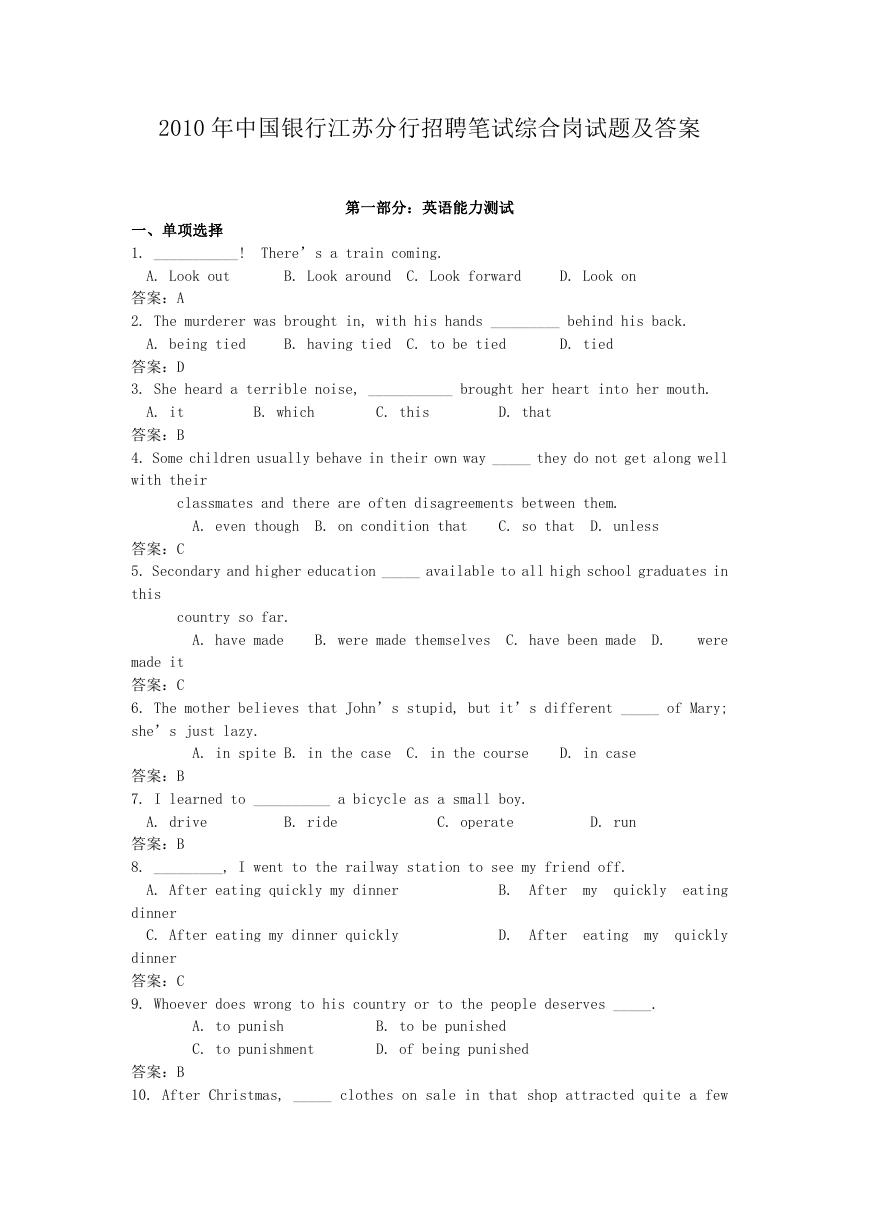



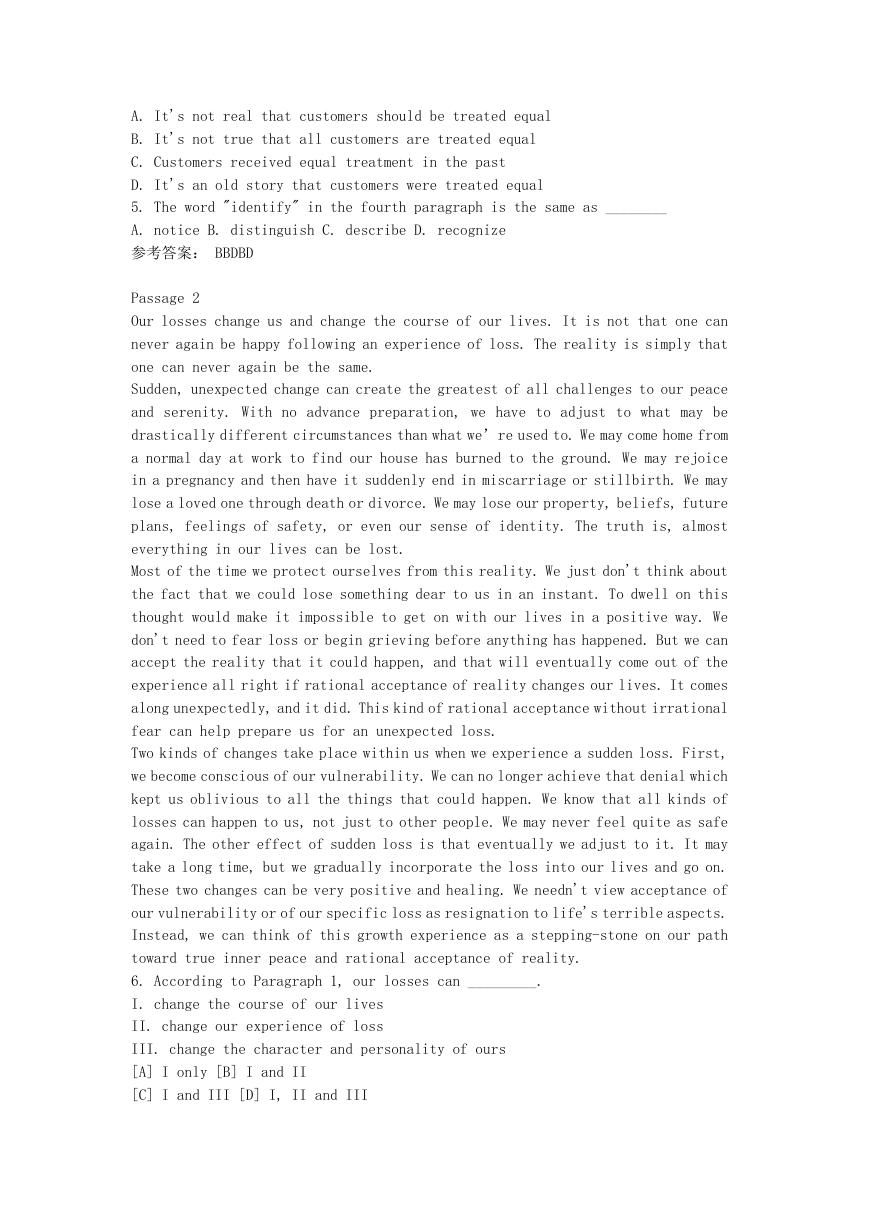
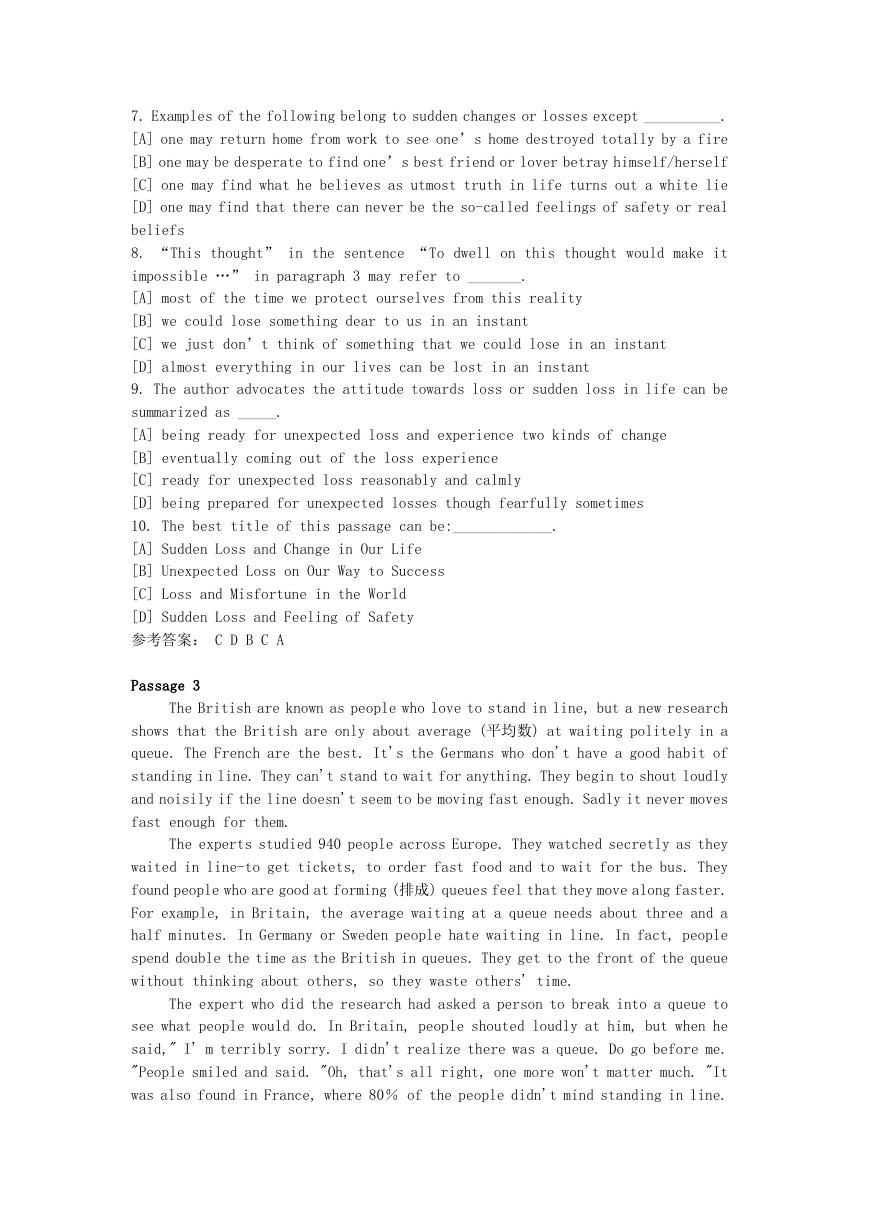
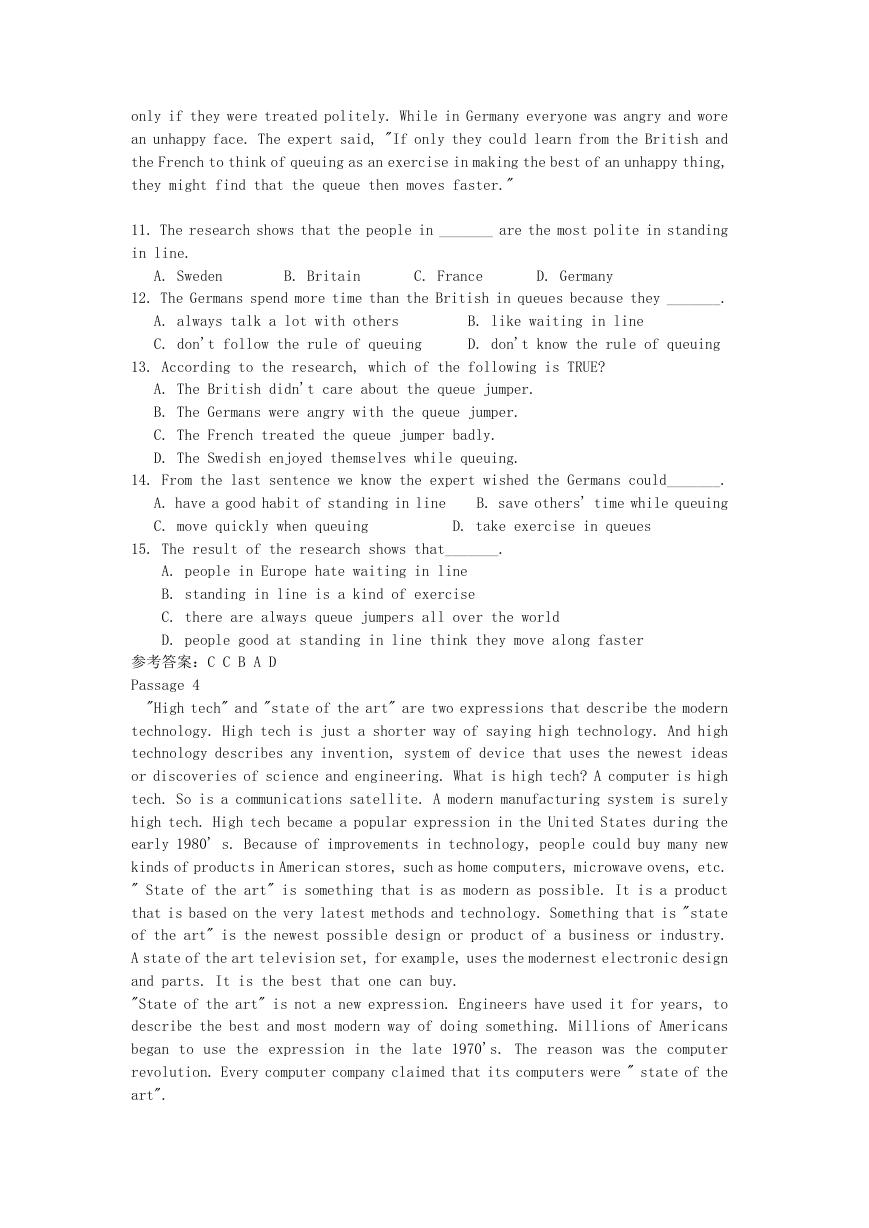
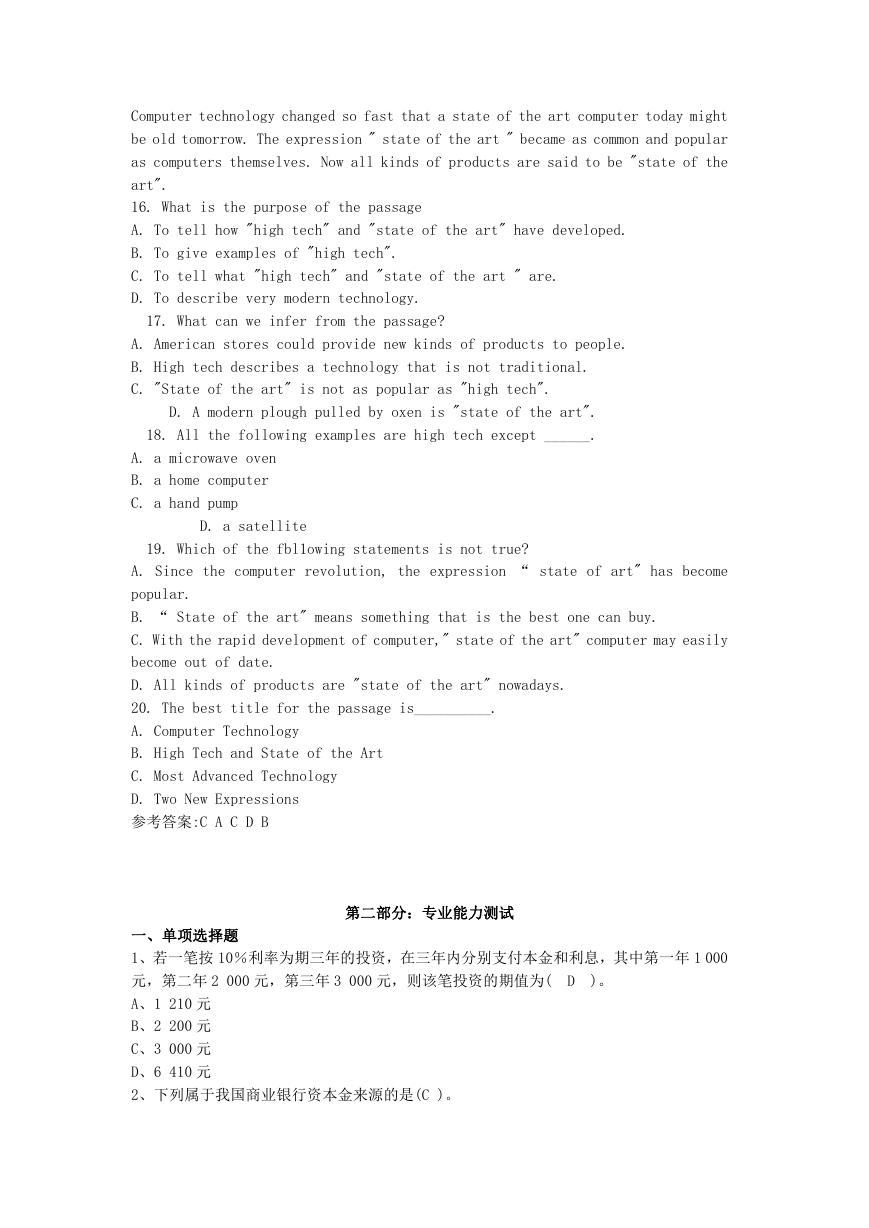








 2023年江西萍乡中考道德与法治真题及答案.doc
2023年江西萍乡中考道德与法治真题及答案.doc 2012年重庆南川中考生物真题及答案.doc
2012年重庆南川中考生物真题及答案.doc 2013年江西师范大学地理学综合及文艺理论基础考研真题.doc
2013年江西师范大学地理学综合及文艺理论基础考研真题.doc 2020年四川甘孜小升初语文真题及答案I卷.doc
2020年四川甘孜小升初语文真题及答案I卷.doc 2020年注册岩土工程师专业基础考试真题及答案.doc
2020年注册岩土工程师专业基础考试真题及答案.doc 2023-2024学年福建省厦门市九年级上学期数学月考试题及答案.doc
2023-2024学年福建省厦门市九年级上学期数学月考试题及答案.doc 2021-2022学年辽宁省沈阳市大东区九年级上学期语文期末试题及答案.doc
2021-2022学年辽宁省沈阳市大东区九年级上学期语文期末试题及答案.doc 2022-2023学年北京东城区初三第一学期物理期末试卷及答案.doc
2022-2023学年北京东城区初三第一学期物理期末试卷及答案.doc 2018上半年江西教师资格初中地理学科知识与教学能力真题及答案.doc
2018上半年江西教师资格初中地理学科知识与教学能力真题及答案.doc 2012年河北国家公务员申论考试真题及答案-省级.doc
2012年河北国家公务员申论考试真题及答案-省级.doc 2020-2021学年江苏省扬州市江都区邵樊片九年级上学期数学第一次质量检测试题及答案.doc
2020-2021学年江苏省扬州市江都区邵樊片九年级上学期数学第一次质量检测试题及答案.doc 2022下半年黑龙江教师资格证中学综合素质真题及答案.doc
2022下半年黑龙江教师资格证中学综合素质真题及答案.doc